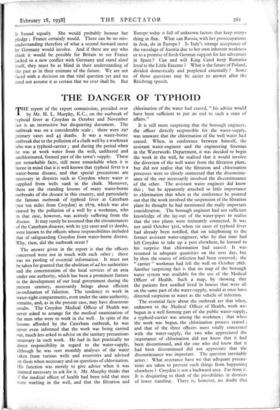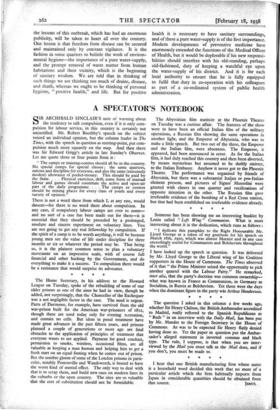THE DANGER OF TYPHOID
THE report of the expert commission, presided over by Mr. H. L. Murphy, K.C., on the outbreak of typhoid fever at Croydon in October and November last is an instructive but disquieting document. The outbreak was on a considerable scale ; there were 297 primary cases and 43 deaths. It was a water-borne outbreak due to the pollution of a chalk well by a workman who was a typhoid-carrier ; and during the period when he was at work water from the well, unfiltered and unchlorinated, formed part of the town's supply. These are remarkable facts, still more remarkable when it is borne in mind that it is well known that typhoid fever is a water-borne disease, and that special precautions are necessary in districts such as Croydon where water is supplied from wells sunk in the chalk. Moreover, there are the standing lessons of many water-borne outbreaks of the disease in this country, and particularly the famous outbreak of typhoid fever at Caterham (not ten miles from Croydon) in 1879, which was also caused by the pollution of a well by a workman, who in that case, however, was actively suffering from the disease. It may surely be assumed that tht circumstances - of the Caterham disaster, with its 352 cases and 21 deaths, were known to the officers whose responsibilities included that of safeguarding Croydon from water-borne disease. Why, then, did the outbreak -occur ?
The answer given in the report is that the officers concerned were not in touch with each other ; there was no pooling of essential information. It must not be taken for granted that the abolition of ad hoc authorities and the concentration of the local services of an area under one authority, which has been a prominent feature in the development of our local government during the present century, necessarily brings about efficient co-ordination of faction. The tendency to work in water-tight compartments, even under the same authority, remains, and, as in the present case, may have disastrous results. The Croydon Medical Officer of Health was never asked to arrange for the medical examination of the men who were to work in the well. In spite of the lessons afforded by the Caterham outbreak, he was never even informed that the work was being carried out, much less asked to advise on the sanitary precautions necessary in such work. He had in fact practically no direct responsibility in regard to the water-supply, although he was sent monthly analyses of the water taken from various wells and reservoirs and advised on them when necessary and on questions of chlorination. His function was merely to give advice when it was deemed necessary to ask for it. Mr. Murphy thinks that if the medical officer of health had been told that men were working in the well, and that the filtration and chlorination of the water had ceased, "his advice would have been sufficient to put an end to such a state of affairs."
It is still more surprising that the borough engineer, the officer directly responsible for the water-supply, was unaware that the chlorination of the well water had ceased. When, in conference between himself, the assistant water-engineer and the engineering foreman in the Waterworks Department, it was decided to begin the work in the well, he realised that it would involve the diversion of the well water from the filtration plant, but did not realise that the filtration and chlorination processes were so closely connected that the discontinu- ance of the one necessarily involved the discontinuance of the other. The assistant water engineer did know this ; but he apparently attached so little importance to chlorination that when at the conference he pointed out that the work involved the suspension of the filtration plant he thought he had mentioned the really important consideration. The borough engineer had not sufficient knowledge of the lay-out of the water-pipes to realise that the two plants were intimately connected. It was not until October 31st, when six cases of typhoid fever had already been notified, that on telephoning to the former assistant water-engineer, who by that time had left Croydon to take up a post elsewhere, he learned to his surprise that chlorination had ceased. It was resumed in adequate quantities on the next day, but by then the source of infection had been removed; the " carrier " workman had left the well on October 26th. Another surprising fact is that no map of the borough water system was available for the use of the Medical Officer of Health. Such a map, by showing that the patients first notified lived in houses that were all on the same part of the water-supply, would at once have directed suspicion to water as the vehicle of infection.
The essential facts about the outbreak are that when, unknown to the Medical Officer of Health, work was begun in a well forming part of the public water-supply, a typhoid-carrier was among the workmen ; that when the work was begun, the chlorination process ceased ; and that of the three officers most vitally concerned with the water-supply, the two who appreciated the importance of chlorination did not know that it had been discontinued, and the one who did know that it had been discontinued did not appreciate that the discontinuance was important. The question inevitably arises : What assurance have we that adequate precau- tions are taken to prevent such things from happening elsewhere ? Croydon is not a backward area. Far from it. It is disquieting to think of the possibilities in districts of lower standing. There is, however, no doubt that the lessons of this outbreak, which has had an enormous publicity, will be taken to heart all over the country. One lesson is that freedom from disease can be secured and maintained only by constant vigilance. It is the fashion in some quarters to belittle the work of environ- mental hygiene—the importance of a pure water-supply, and the prompt removal of waste matter from human habitations and their vicinity, which is the beginning of sanitary wisdom. We are told that in thinking of such things we are thinking too much of drains, disease, and death, whereas we ought to be thinking of personal hygiene, "positive health," and life. But for positive health it is necessary to have sanitary surroundings, and of these a pure water-supply is of the first importance. Modern developments of preventive medicine have enormously extended the functions of the Medical Officer of Health, but it would be deplorable if his new responsi- bilities should interfere with his old-standing, perhaps old-fashioned, duty of keeping a watchful eye upon the water-supply of his district. And it is for each local authority to ensure that he is fully equipped to fulfil that duty in co-operation with his colleagues as part of a co-ordinated system of public health administration.











































 Previous page
Previous page